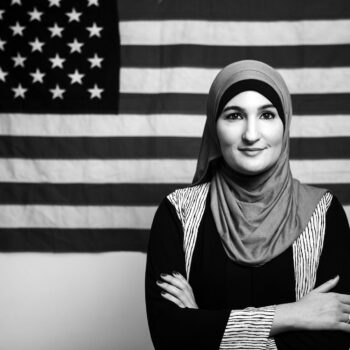She was so beautiful. Small and brown skinned, with butterfly wings on her back. She walked over to two Muslim religious leaders standing outside the U.S. Capitol in traditional garb, and said something to them in Spanish. They did not understand, so they called me over and, with my limited comprehension, I translated. She wanted to fly. They picked her up and held her high. It was Monday, March 5th, 2018, the day that DACA was set to expire. Muslim, Jewish, and immigrant rights leaders had staged a sit-in outside of Speaker Paul Ryan’s office. Over two dozen people were arrested, including me. The trust that this young Ecuadorian girl put in two men she had just heard speak on immigrant rights reflected the solidarity that grew across our movement in the weeks following the election of Donald Trump.
I had been organizing in the immigrant rights movement since the aftermath of the horrific attacks of 9/11, when I witnessed my beloved community go from mourning our neighbors to becoming suspects ourselves. Both the Bush and Obama administrations targeted Arab, Muslim, and immigrant communities under the guise of “national security — making it imperative for our movements to understand the intersections between anti-Black racism, xenophobia, and Islamophobia. This wasn’t always easy due to misinformation and propaganda pinning our communities against each other. The concerns of our communities were also siloed within the progressive movement.
The election of Donald Trump forced our movement to work in greater solidarity — to make intersectionality a practice rather than an academic term. Trump demonstrated in the cruelest of ways that the policies that impact undocumented folks, immigrants, refugees, Muslims, Black people, and other marginalized folks are part of a larger white supremacist system that has terrorized communities in America for hundreds of years. Within the movement, we stopped talking about racial justice separately from economic justice, gender justice, or immigrant rights, and started having one large conversation that connected all the dots.
Progressives no longer saw Arabs and Muslims as political liabilities; they began to see us as partners in their work to resist the racist, xenophobic, and misogynistic agenda of the Trump administration. For the first time in fifteen years, Muslims were invited to large coalitions, organizing tables, and direct actions. I will never forget the 2017 Women’s March on Washington, the largest single day of protest in American history, when women all over the world held up a poster with a Muslim woman in an American flag hijab that read: “We the People – Are Greater Than Fear.”
As a co-founder of the Women’s March, I used my platform to ensure that immigrants and undocumented people had a seat at the table. I centered the issues most impacting immigrant communities, including the call to Abolish ICE, end deportations, defend DACA, and create a pathway to citizenship for all. I educated women across the country on the ways that immigrant rights are a women’s rights issue. This required deep relationship building, education, and amplification of the stories of immigrants and their families.
Over the past four years, I have been working to build power across communities through bold and radical solidarity that can outlast any one presidential administration. Our movement grew stronger through courageous conversations among America’s leading resistors, who took the time to listen, learn, and commit to fighting for communities that were not our own.
As we move into a new era, one lesson I will take with me is that solidarity is a verb. It requires action. Solidarity is not just about standing next to me at a rally or signing a petition; it is about having my back when I am not in the room. Solidarity is about centering the voices and stories of those who may not have a seat at the table but deserve one. It is rooted in the fundamental understanding that we need all of us to win. It is about being okay with losing a campaign or piece of legislation because we decided not to leave anyone behind.
I have preached this across our movement spaces: unity is not uniformity. We will never agree on all policies, campaigns, pieces of legislation, or talking points. But, we must stop pushing policies, campaigns, or narratives that leave communities out because we believe it is more strategic.
We have a lot more work to do. Our communities are still suffering from a global pandemic as well as the ongoing pandemics of poverty, racism, and xenophobia. In this critical moment, I am calling our people to a higher moral ground. I am suggesting we be bold, fierce, and unapologetic in the way we fight for all of us. Let the little girl’s butterfly wings inspire us to work towards a country and world where we can all be as free as the monarch butterfly.
Read the issue: Debriefing the Resistance

